Humidifier Benefits: How a Humidifier Can Help You Stay Comfortable in Winter
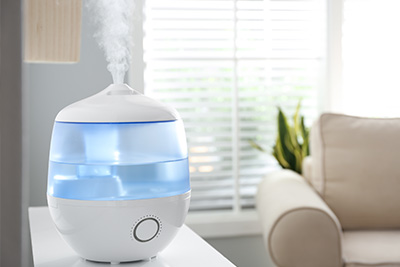
Throughout most of the U.S., winter weather means drier air. That dryness can cause a variety of problems, including structural damage to homes and furniture, physical discomfort and overly dry eyes, skin and sinuses. You can counteract these effects by using humidifiers at home, but you have to be careful – too much humidity in wintertime can cause a different type of damage.
What Is a Humidifier?
A humidifier is an appliance that adds moisture to the air, usually within a specific room or structure. There are a variety of humidifier types that create moist air in different ways and at different capacities, but they’re all commonly used to maintain a safe and comfortable relative humidity level indoors.
What Is Relative Humidity?
Relative humidity is the most common measure of humidity we use in indoor spaces. It’s the ratio of the current humidity level to the maximum possible humidity level, which varies with air temperature. Warmer air can hold more moisture than colder air, so the relative humidity of a cold space will be higher than the relative humidity of a warm space, even when the absolute humidity of both spaces is the same.
The optimal relative humidity for indoor spaces is between 30 and 50 percent, according to the Mayo Clinic, but there are some exceptions, which we’ll get into below. You can measure the relative humidity around your home with a device called a hygrometer; handheld digital hygrometers are inexpensive and widely available at hardware stores. If your relative humidity is too low, you can raise it with the use of humidifiers, and if it’s too high, you can lower it with dehumidifiers.
Does Humidity Make It Feel Hotter?
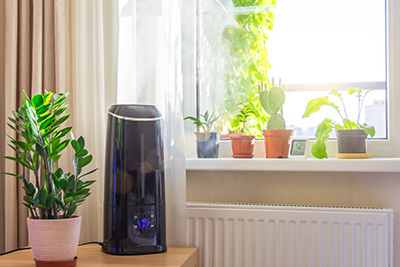
You’ve probably heard the phrase “it’s not the heat, it’s the humidity” in reference to steamy summer weather. It’s true that higher humidity can make you feel hotter – during hot weather, high outdoor humidity slows our bodies’ natural evaporative process of sweating, which makes it harder for us to cast off heat. But even in moderate temperatures, humidity can help you feel warmer because wetter air retains heat more efficiently than drier air.
So you may be able to feel a bit more comfortable by increasing your relative humidity during the cold winter months, but it’s important to avoid increasing it too much.
The Dangers of High Relative Humidity in Winter
The risk of adding indoor humidity during cold weather is that it can cause condensation or even frost to develop on your exterior windows and walls. Just like condensation forms on the outside of a cold soda can when it comes into contact with warm, humid air, condensation can also form inside your warm, humid home due to the cold, dry conditions outside. If this condensation development occurs repeatedly, the moisture can rot away wood and drywall and contribute to the formation of mold and mildew.
If you notice that condensation or frost is developing inside your home during winter, there are two ways you can confront the problem. One way is to improve the insulation of the affected areas by adding insulation to wall cavities and replacing windows with more efficient models. This is, of course, an expensive and high-involvement solution. The other approach is to lower the relative humidity of the affected rooms during extremely cold outdoor temperatures, which may require you to use a dehumidifier. This comes at a different cost – feeling colder, having drier skin, etc. – but is arguably preferable to damage to your home.
Humidifier Benefits
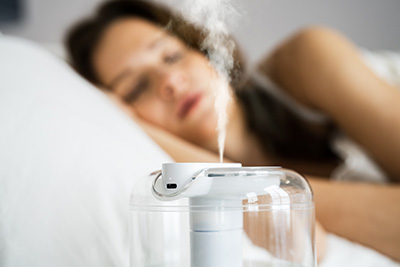
In addition to helping you feel warmer at home, using humidifiers during winter can deliver several benefits:
- Less dryness of sensitive tissue. Skin, eyes and sinuses can become unbearably dry under winter conditions. By humidifying the spaces where you spend the most time, like your home and office, you can help your body retain moisture.
- Better sleep. Dry indoor air can make your nose and throat uncomfortably dry as you sleep, and can worsen snoring. This can not only leave you with an unpleasant feeling when you wake up, it can wake you up in the middle of the night due to thirst. Running a humidifier at your bedside can reduce or eliminate these effects.
- Milder cold symptoms. Winter is cold and flu season, and if you get sick, dry air can make common symptoms much more miserable to endure. Using a humidifier can make your recovery process more pleasant, according to the Mayo Clinic, but you should always be sure to consult a physician about the best approach to treating your illness.
- Protection for wood furnishings. Excessively dry air can cause wood, especially untreated wood, to shrink and crack. Over several winters, this can seriously damage wood furniture, windowsills, trim and other elements in your home.
- Healthy houseplants. If you feel thirstier than usual in your dry wintertime home, your plants do, too. Keeping your relative humidity steady throughout the year will help your houseplants stay healthy without changing your watering routine.
How Does a Humidifier Work?
There are several different types of humidifiers, including whole-home humidifiers and standalone models, and they all work a little differently. Here are the most common whole-home humidifier types, which work in conjunction with a central HVAC system:
- Bypass humidifiers. These systems work by circulating water in the path of the airflow from your forced air heating system, adding moisture to the warm air that comes out of your vents.
- Power humidifiers. These humidifiers are similar to bypass humidifiers, but have their own internal fan to help move moist air. They still rely on air movement from the HVAC system, but the additional fan helps improve circulation.
- Steam humidifiers. These models have their own integrated boiler and heat water to create warm steam, which is then routed into your HVAC ductwork.
There are also several types of standalone humidifiers, including:
- Cool mist humidifiers. These simple, affordable humidifiers work by using a fan to circulate air through a filter that wicks cold water. It creates a soothing mist without adding to the temperature of the room.
- Warm mist humidifiers. These humidifiers heat water to create vapor, then cool the vapor before circulating it into a room with a fan. The heating process helps purify the vapor and can add a small amount of heat to the air in a room, making it ideal for winter use.
- Vaporizer humidifiers. A vaporizer humidifier combines the functionality of a cool mist and warm mist vaporizer into a single unit.
- Ultrasonic humidifiers. These humidifiers have internal parts that vibrate rapidly, “bouncing” tiny droplets of water into the air instead of blowing them with a fan. They’re extremely quiet and energy efficient, and they often come with both cool and warm mist settings, but they tend to be more expensive than the other types.
Whichever type of humidifier you choose, using it in wintertime can be one of the most effective ways to remain hydrated and comfortable throughout the dry season. Just be sure to keep an eye on your relative humidity and avoid a buildup of condensation on your windows and walls!
Looking for Something Specific?
Select a category to find resources for topics that interest you.
Select Category

Related Articles:

What to Do Before, During and After Power Outages
With a little knowledge and preparation, you can protect yourself, your home and your belongings during power outages of any duration.
Read Article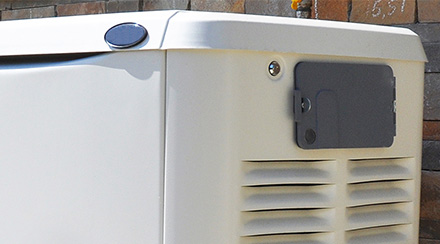
How to Choose a Generator for Your Home
Power outages can be miserable, but with the right generator, you can keep your family safe and comfortable until power is restored. Learn how to choose the best generator for your home.
Read Article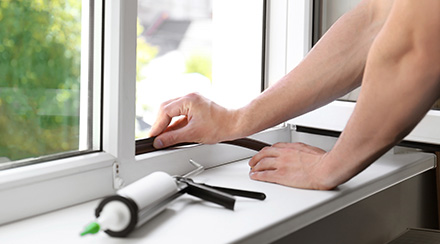
Weatherize Your Home for Summer
The extreme heat of summer can really do a number on your energy bills. But if you’re able to invest a little time and money into weatherizing to keep your home cool, you can help yourself and your family remain comfortable at home while still saving energy.
Read ArticleMost Popular Articles

Energy Plans to Fit Your Lifestyle
NRG offers electricity and natural gas plans with perks like cash back, travel rewards and more, so you can find a plan that fits your home and family.
Humidifier Benefits: How a Humidifier Can Help You Stay Comfortable in Winter
Throughout most of the U.S., winter weather means drier air. That dryness can cause a variety of problems, including structural damage to homes and furniture, physical discomfort and overly dry eyes, skin and sinuses. You can counteract these effects by using humidifiers at home, but you have to be careful – too much humidity in wintertime can cause a different type of damage.
What Is a Humidifier?
A humidifier is an appliance that adds moisture to the air, usually within a specific room or structure. There are a variety of humidifier types that create moist air in different ways and at different capacities, but they’re all commonly used to maintain a safe and comfortable relative humidity level indoors.
What Is Relative Humidity?
Relative humidity is the most common measure of humidity we use in indoor spaces. It’s the ratio of the current humidity level to the maximum possible humidity level, which varies with air temperature. Warmer air can hold more moisture than colder air, so the relative humidity of a cold space will be higher than the relative humidity of a warm space, even when the absolute humidity of both spaces is the same.
The optimal relative humidity for indoor spaces is between 30 and 50 percent, according to the Mayo Clinic, but there are some exceptions, which we’ll get into below. You can measure the relative humidity around your home with a device called a hygrometer; handheld digital hygrometers are inexpensive and widely available at hardware stores. If your relative humidity is too low, you can raise it with the use of humidifiers, and if it’s too high, you can lower it with dehumidifiers.
Does Humidity Make It Feel Hotter?
You’ve probably heard the phrase “it’s not the heat, it’s the humidity” in reference to steamy summer weather. It’s true that higher humidity can make you feel hotter – during hot weather, high outdoor humidity slows our bodies’ natural evaporative process of sweating, which makes it harder for us to cast off heat. But even in moderate temperatures, humidity can help you feel warmer because wetter air retains heat more efficiently than drier air.
So you may be able to feel a bit more comfortable by increasing your relative humidity during the cold winter months, but it’s important to avoid increasing it too much.
The Dangers of High Relative Humidity in Winter
The risk of adding indoor humidity during cold weather is that it can cause condensation or even frost to develop on your exterior windows and walls. Just like condensation forms on the outside of a cold soda can when it comes into contact with warm, humid air, condensation can also form inside your warm, humid home due to the cold, dry conditions outside. If this condensation development occurs repeatedly, the moisture can rot away wood and drywall and contribute to the formation of mold and mildew.
If you notice that condensation or frost is developing inside your home during winter, there are two ways you can confront the problem. One way is to improve the insulation of the affected areas by adding insulation to wall cavities and replacing windows with more efficient models. This is, of course, an expensive and high-involvement solution. The other approach is to lower the relative humidity of the affected rooms during extremely cold outdoor temperatures, which may require you to use a dehumidifier. This comes at a different cost – feeling colder, having drier skin, etc. – but is arguably preferable to damage to your home.
Humidifier Benefits
In addition to helping you feel warmer at home, using humidifiers during winter can deliver several benefits:
- Less dryness of sensitive tissue. Skin, eyes and sinuses can become unbearably dry under winter conditions. By humidifying the spaces where you spend the most time, like your home and office, you can help your body retain moisture.
- Better sleep. Dry indoor air can make your nose and throat uncomfortably dry as you sleep, and can worsen snoring. This can not only leave you with an unpleasant feeling when you wake up, it can wake you up in the middle of the night due to thirst. Running a humidifier at your bedside can reduce or eliminate these effects.
- Milder cold symptoms. Winter is cold and flu season, and if you get sick, dry air can make common symptoms much more miserable to endure. Using a humidifier can make your recovery process more pleasant, according to the Mayo Clinic, but you should always be sure to consult a physician about the best approach to treating your illness.
- Protection for wood furnishings. Excessively dry air can cause wood, especially untreated wood, to shrink and crack. Over several winters, this can seriously damage wood furniture, windowsills, trim and other elements in your home.
- Healthy houseplants. If you feel thirstier than usual in your dry wintertime home, your plants do, too. Keeping your relative humidity steady throughout the year will help your houseplants stay healthy without changing your watering routine.
How Does a Humidifier Work?
There are several different types of humidifiers, including whole-home humidifiers and standalone models, and they all work a little differently. Here are the most common whole-home humidifier types, which work in conjunction with a central HVAC system:
- Bypass humidifiers. These systems work by circulating water in the path of the airflow from your forced air heating system, adding moisture to the warm air that comes out of your vents.
- Power humidifiers. These humidifiers are similar to bypass humidifiers, but have their own internal fan to help move moist air. They still rely on air movement from the HVAC system, but the additional fan helps improve circulation.
- Steam humidifiers. These models have their own integrated boiler and heat water to create warm steam, which is then routed into your HVAC ductwork.
There are also several types of standalone humidifiers, including:
- Cool mist humidifiers. These simple, affordable humidifiers work by using a fan to circulate air through a filter that wicks cold water. It creates a soothing mist without adding to the temperature of the room.
- Warm mist humidifiers. These humidifiers heat water to create vapor, then cool the vapor before circulating it into a room with a fan. The heating process helps purify the vapor and can add a small amount of heat to the air in a room, making it ideal for winter use.
- Vaporizer humidifiers. A vaporizer humidifier combines the functionality of a cool mist and warm mist vaporizer into a single unit.
- Ultrasonic humidifiers. These humidifiers have internal parts that vibrate rapidly, “bouncing” tiny droplets of water into the air instead of blowing them with a fan. They’re extremely quiet and energy efficient, and they often come with both cool and warm mist settings, but they tend to be more expensive than the other types.
Whichever type of humidifier you choose, using it in wintertime can be one of the most effective ways to remain hydrated and comfortable throughout the dry season. Just be sure to keep an eye on your relative humidity and avoid a buildup of condensation on your windows and walls!
Looking for Something Specific?
Select a category to find resources for topics that interest you.
Select Category

Related Articles:

What to Do Before, During and After Power Outages
With a little knowledge and preparation, you can protect yourself, your home and your belongings during power outages of any duration.
Read Article
How to Choose a Generator for Your Home
Power outages can be miserable, but with the right generator, you can keep your family safe and comfortable until power is restored. Learn how to choose the best generator for your home.
Read Article
Weatherize Your Home for Summer
The extreme heat of summer can really do a number on your energy bills. But if you’re able to invest a little time and money into weatherizing to keep your home cool, you can help yourself and your family remain comfortable at home while still saving energy.
Read ArticleMost Popular Articles

Energy Plans to Fit Your Lifestyle
NRG offers electricity and natural gas plans with perks like cash back, travel rewards and more, so you can find a plan that fits your home and family.







